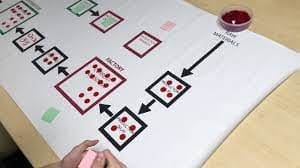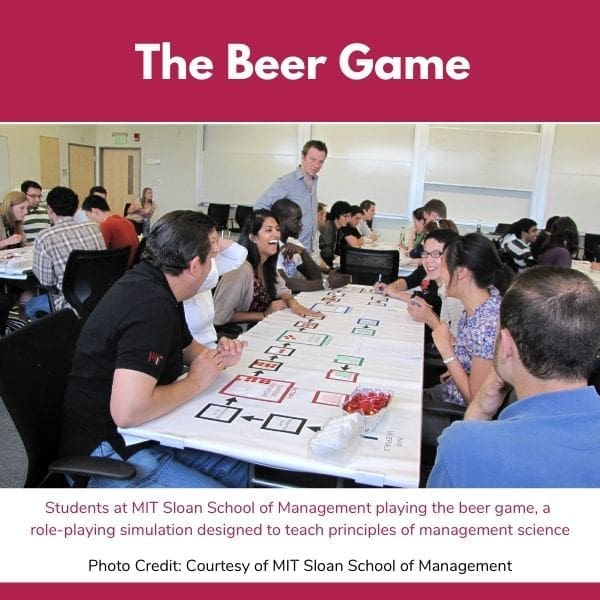The Beer Game: Understanding the Complexities of Supply Chain
The Beer Game: Understanding the Complexities of Supply Chain
The Beer Game, a simulation game developed by MIT, simplifies the complex and challenging field of supply chain management by providing a unique and interactive way to learn. Decades of students, professionals, and businesses have used the game to grasp supply chain dynamics and improve processes.
As a player of the Beer Game, you assume the roles of a retailer, wholesaler, distributor, or factory in a beer distribution supply chain. Your task involves managing inventory and ordering based on customer demand, striving to minimize costs and meet demand.

Beer Game, a supply chain management game
The Beer Game highlights the bullwhip effect, which causes increased variability in orders as one moves up the supply chain. This increased variability leads to higher costs, decreased customer satisfaction, and supply chain inefficiencies. Through playing the game, you witness the bullwhip effect and understand your actions’ impact on the rest of the supply chain.
Inventory management is another crucial aspect of the Beer Game. You balance the need for enough inventory to meet demand with the cost of holding too much. This helps you understand the trade-off between inventory levels and costs and the significance of accurate demand forecasts. The Beer Game serves as a valuable tool for anyone seeking to comprehend supply chain management. It offers a unique and interactive way to learn about the bullwhip effect, inventory management, and other crucial concepts in a fun and engaging manner. Whether you are a student, professional, or business owner, the Beer Game deepens your understanding of supply chain management.
FREQUENTLY ASKED QUESTIONS ABOUT THE BEER GAME
What is the Beer Game about?
The Beer Game is a simulation game designed to teach players about the complexities of supply chain management. Participants take on the role of participants in a four-stage supply chain and work to meet the demand for beer while balancing inventory and avoiding excess costs.
How many people can play the Beer Game?
The game can be played with a minimum of four players, with each player taking on the role of one of the four stages of the supply chain. Larger groups can also play, with multiple players taking on the same role.
What can the game teach us?
The Beer Game highlights the challenges and inefficiencies that can arise from miscommunication and poor decision-making in a supply chain. It also demonstrates how small actions at one stage of the supply chain can have significant impacts on other stages.
Who is the game meant for?
The game is suitable for individuals of all backgrounds, from students to business professionals, and anyone interested in understanding the complexities of supply chain management.
How can I facilitate?
Facilitating the Beer Game is easy and can be done in a classroom or meeting setting. The System Dynamics Society offers a complete game set for purchase, including all necessary materials and instructions for conducting the simulation. If you need a facilitator, you can fill out this form.
How can I purchase the game?
You can purchase the game from the System Dynamics Society here and we ship worldwide.
Recent Posts
Call for Presenters: Seminar Series
Call for Presenters: Seminar Series We at the System Dynamics Society are continually seeking vibrant and knowledgeable presenters for our ongoing Seminar Series. As we unfold the calendar, there’s always a place for more insights, experiences, and expertise to enrich...
Honoring Excellence: A Glimpse into the Awards of the International System Dynamics Conference
Honoring Excellence: A Glimpse into the Awards of the International System Dynamics Conference The International System Dynamics Conference brings together experts, practitioners, and students to exchange ideas, showcase real-world applications, and celebrate...
From Bergen to Global: UiB’s System Dynamics Group
From Bergen to Global: UiB’s System Dynamics Group The System Dynamics Group, an autonomous research group at the University of Bergen (UiB) was established in 1971 by professor emeritus Svein Nordbotten. Inspired by the work of Jay W. Forrester, Nordbotten...
Upcoming Events
Health Policy SIG Networking and Collaboration Event
Please join us for our quarterly Health Policy SIG virtual social hour! Agenda: TBD
Recent Business cases
Solving Bottlenecks in Dairy Production Facilities with System Dynamics
Solving Bottlenecks in Dairy Production Facilities with System Dynamics EXECUTIVE Summary FrieslandCampina faced potential bottlenecks in production due to the merging of two factories. They hired SD&Co which employed system dynamics simulation models to predict...
A Design Value Calculator: A System Dynamics Boardgame
A Design Value Calculator: A System Dynamics Boardgame EXECUTIVE Summary Product design is a specific form of complex innovation that touches all areas of an organization’s management. While entrepreneurs recognise the value of design, they often tend to focus...
The World Bank Uses System Dynamics to Identify Root Causes of Poverty
The World Bank Uses System Dynamics to Identify Root Causes of Poverty EXECUTIVE Summary Madagascar has one of the highest poverty rates in the world. In 2022, an astonishingly three out of every four people in Madagascar lived below the poverty line. Poverty has...


